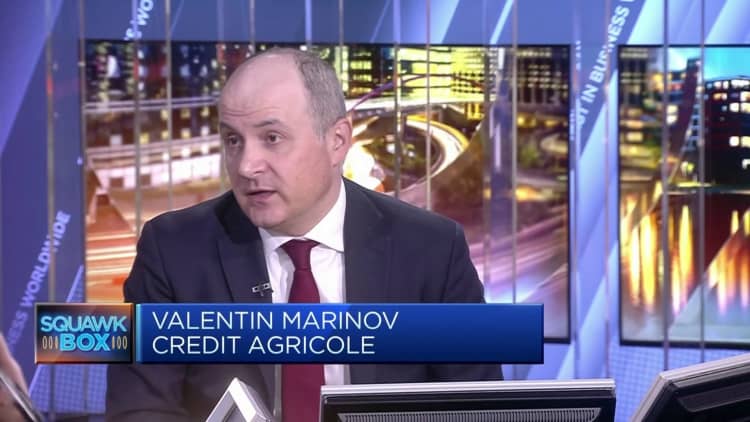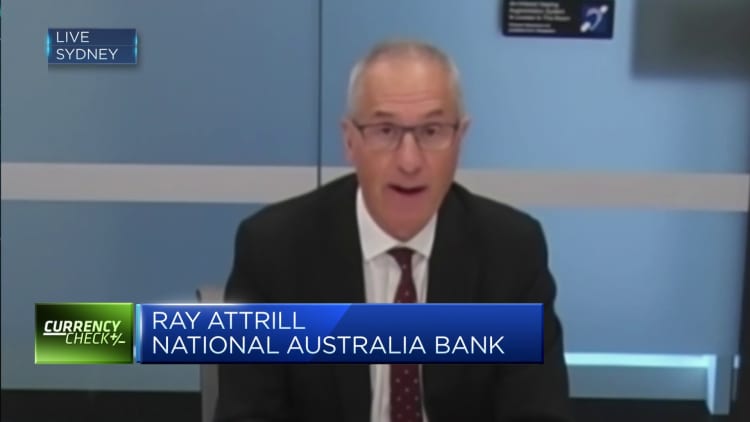LONDON — The British pound is the best performing G-10 (Group of Ten) currency of 2023, and some strategists believe the pound's rally can continue over the medium term.
Sterling is up by more than 3% against the dollar since the start of the year, notching a 10-month high on Wednesday, fueled primarily by better-than-expected economic data and a weakened greenback.
The pound was roughly unchanged against the dollar on Thursday morning, trading at around $1.2455 near 11:30 a.m. London time. The currency has rebounded spectacularly from the record lows seen in September, after former Prime Minister Liz Truss' disastrous "mini-budget."
Deutsche Bank noted that the market came into 2023 too short on sterling, given the excessively gloomy sentiment fueled by bleak economic predictions from the IMF, the Bank of England and the U.K.'s Office for Budget Responsibility — all of which projected lengthy recessions.
The British economy has thus far avoided recession and posted stronger-than-expected growth in January. Outlooks from the major economic forecasters have now been upgraded, with the OBR no longer projecting a technical recession — defined as two consecutive quarters of negative growth — in 2023.
The country's fiscal position has drastically improved, due in large part to a sharp fall in gas prices, and further fiscal support from the government has fed into the growing positivity.

Yet the picture is still not entirely rosy. The U.K. remains the only G-7 major economy not to have recovered its pre-Covid level of output, and inflation is still hovering in double digits. British households continue to contend with high food and energy bills, while workers across a range of sectors have launched mass strike action in recent months amid disputes over conditions and pay.
The Bank of England hiked interest rates by 25 basis points to their highest level since 2008, as policymakers grapple with persistently high inflation. The market is pricing around a 63% chance of a further quarter-point hike at the Bank's May meeting.
Risks 'skewed to the upside'
Deutsche Bank at the start of the year called that cable would hit $1.25 — with that projection nearly met, FX Strategist Shreyas Gopal suggested in a note Wednesday that "most of the good U.K. news is now likely in the price."
"The market has converged to our view that UK growth expectations can be upgraded in line with other major economies for this year, though our house view is still more optimistic than the new consensus," Gopal said.
"In the micro, the move in the currency over the past month looks a little overdone versus relative rates performance, with the added kicker that the market is still mostly pricing another hike by the BoE at the May meeting but our base case is for a hold."
Yet real rate differentials could offer upside for cable over the medium term, since it has been "dislocated and too cheap" for almost a year now, Gopal suggested.

"This time last year, this spread was 100 bps worse for GBP, yet Cable was around 1.30, and if the remaining premium is coming more from the USD side of the equation, the pound looks well placed to be amongst the relative winners in a dollar downturn if private sector leverage is the key differentiator over the remainder of the cycle," Gopal said.
The diminished external vulnerabilities signaled by improved current account data — due to both reduced gas prices and the U.K.'s concentration of foreign direct investment in the energy sector — could also prove supportive, Gopal said.
"All up, the domestic good news may now be in the price, but given the external backdrop the risks to our Cable forecasts are still skewed to the upside," he added. Deutsche is recommending that investors stay long on the pound against both the U.S. dollar and Swedish krona.
Strongest of the weak
After soaring between late 2020 and late 2022, the traditional safe haven of the U.S. dollar has weakened substantially, with the DXY U.S. dollar currency index down more than 9% over the past six months.
Ray Attrill, head of FX strategy within the Fixed income, Currencies and Commodities division of National Australia Bank, told CNBC's "Street Signs Asia" on Wednesday that the greenback got "incredibly overvalued" and that the Japanese yen and British pound were the two most "undervalued."
As such, he suggested that, although much of the recent good news has been priced into sterling's recent leap from $1.19 to $1.25 over a short time frame, those two currencies are well placed to benefit from the dollar's "correction" over the medium term.
"If you looked at it on a longer-term purchasing power parity argument, or similar kind of real exchange rate arguments, sterling and the yen are the standout weak currencies here. So, on that basis, if the U.S. dollar is going to continue to head south, then they'd probably be the two, in terms of G-10, that arguably have the most upside potential here," Attrill said.
Fundamentals not enough for 'strong conviction'
Not everyone is quite so convinced. Valentin Marinov, head of G-10 FX research at Credit Agricole CIB, told CNBC on Thursday that, although the data has been surprisingly resilient, the outlook for the British economy is "still not that great even in relative terms."
"It certainly helps, the fact that other economies like the U.S. have seen their outlook deteriorating quite rapidly, so that is helping the pound, but I wouldn't think that the pound is a strong conviction buy purely on the basis of domestic fundamentals," Marinov said.
He also highlighted that, historically, sterling has been among the worst performing major currencies in the initial stages of recessions dating back to 1980 — so, with global growth concerns persisting as central banks continue to hike interest rates, the pound may not be the safest bet right now.
"At current levels, certainly remarkable performance going against our own forecasts, but I wouldn't think that this will extend to a sustainable uptrend from here, I would rather sell cable here," he said.
"Euro-sterling seems a bit more fairly priced, but, again, here it's really about to what extent the continental European outlook could deteriorate to sort of reconverge back to the low benchmark that the U.K. case still is."

